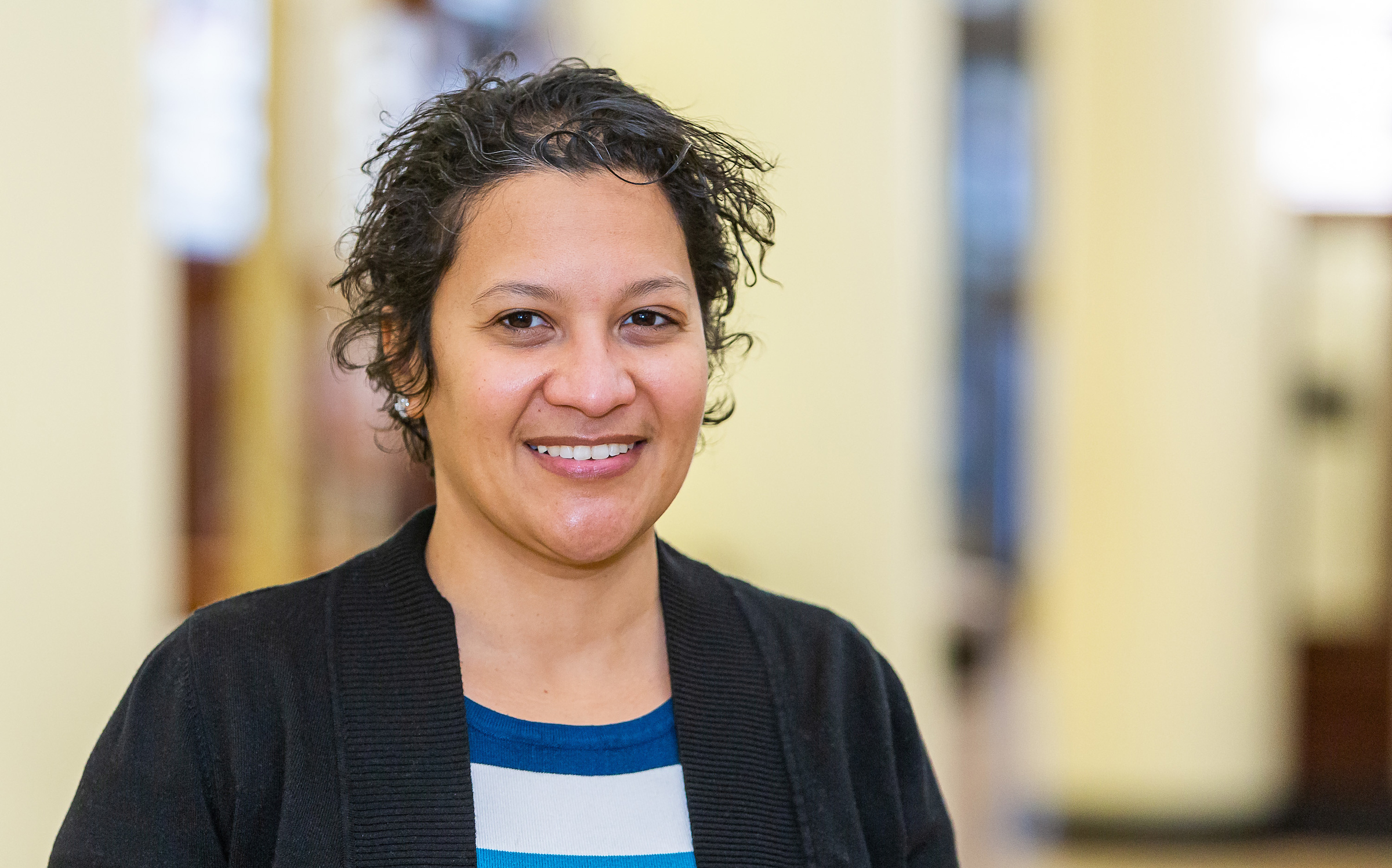 Roselyne Tchoua, assistant professor in the School of Computing, aims to use machine learning to reduce repeat visits to the emergency department. (DePaul University/Randall Spriggs)
Roselyne Tchoua, assistant professor in the School of Computing, aims to use machine learning to reduce repeat visits to the emergency department. (DePaul University/Randall Spriggs)Computer scientist Roselyne Tchoua extracts knowledge from mountains of text. Whether the words describe alloys or illnesses, Tchoua builds models that surface insight from textual content. She also works to discover patterns in other types of scientific data. But she can’t do it alone.
“Machines are really good at processing large amounts of data, but humans are trained to detect patterns. Machines learn models quickly with high accuracy, but they often require instructions and well-defined problems to learn,” says Tchoua, an assistant professor in the School of Computing. “I’m interested in bringing a human perspective, specifically a trained scientific expert’s input, into a model.”
Tchoua has been named an Equity Research Fellow with the Sinai Urban Health Institute, where she aims to use machine learning to reduce repeat visits to the emergency department.
The SUHI Equity Research Fellows program strengthens research and collaboration among scientists and universities who share a focus on improving health equity in Chicago and beyond. Part of the Sinai Health System, the institute fulfills its mission through epidemiological research, community-informed interventions and program evaluation. This is the fourth year that DePaul faculty members have earned fellowships with SUHI.
“Roselyne’s fellowship truly embodies a human-centered, cross-disciplinary research approach. She is engaging community health workers with researchers from a wide range of fields including data science and computer science,” says Daniela Stan-Raicu, associate provost for research at DePaul. Using machine learning to ask the right questions
Tchoua will spend one day a week immersed at Sinai, attending meetings and collaborating with her SUHI liaison, Kelly McCabe, and community health workers. Sinai surveys a number of patients, and then community health workers connect them to resources and care. Tchoua aims to build a model that can comb through survey responses to predict what helps a patient stay healthy and out of the hospital when possible.
“It’s a win for the patient and the hospital when a patient doesn’t keep returning to the emergency department,” Tchoua says.
Tchoua plans to consult closely with Sinai’s community health workers — many of whom are from the neighborhoods where they work — to gain further insights.
“These workers belong to these communities, so they know a bit more about the patients and can ask the right questions. They can make the patient comfortable,” Tchoua says.
Patients sometimes do not answer the questions that can be strong indicators of repeat emergency visits. A lack of transportation, not having a primary care physician or a history of substance abuse are all data points that an experienced health care worker and a well-designed survey instrument can work together to uncover. Tchoua will also track interventions to see if they achieve results.
“I’m hoping to make a concrete argument about what’s working, and to help community health workers learn what makes a difference,” she says.
This year, Tchoua will have DePaul students assist in cleaning and analyzing the data once it is stripped of private information. If the model is successful, Tchoua hopes it could be used at other locations in Chicago and beyond. She’s looking forward to sharing the data with students in her class, instead of assigning a random data set.
“They will have a meaningful, real world example to work on,” Tchoua says.
In previous and ongoing work, Tchoua has worked in material informatics, extracting polymer names and properties from text.
“The goal of materials informatics is to leverage large amounts of data to enable targeted design of new materials,” Tchoua explains. She researches scientific applications of machine learning, which uses data to allow computers to recognize patterns.
Earlier in her career, Tchoua was a scientist at Oak Ridge National Laboratory, working on an online simulation data management and collaboration tool for high-performance computing scientists.
Since arriving at DePaul in 2019, Tchoua has been inspired by the university’s emphasis on collaborative research, especially around health care. Along the way, she has been drawn to the health sciences, for example conducting research that uses data to help radiologists pinpoint lung nodules.
“It’s exciting to be in a field like data science that has to be interdisciplinary, and at a university where it’s encouraged to work on applied research problems,” Tchoua says. “I don’t think machines are here to take over for humans or that you won’t need doctors, radiologists or other experts. The best work comes from the combination of the two.”